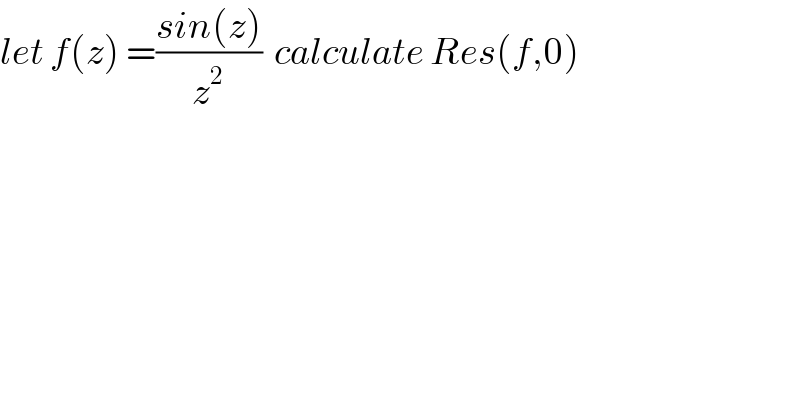Question Number 63031 by mathmax by abdo last updated on 28/Jun/19

$${let}\:{f}\left({z}\right)\:=\frac{{sin}\left({z}\right)}{{z}^{\mathrm{2}} }\:\:{calculate}\:{Res}\left({f},\mathrm{0}\right) \\ $$
Commented by mathmax by abdo last updated on 28/Jun/19

$$\mathrm{0}\:{is}\:{a}\:{double}\:{pole}\:\Rightarrow{Res}\left({f},\mathrm{0}\right)\:={lim}_{{z}\rightarrow\mathrm{0}} \:\:\:\frac{\mathrm{1}}{\left(\mathrm{2}−\mathrm{1}\right)!}\left\{{z}^{\mathrm{2}} {f}\left({z}\right)\right\}^{\left(\mathrm{1}\right)} \\ $$$$={lim}_{{z}\rightarrow\mathrm{0}} \:\left\{{sinz}\right\}^{\left(\mathrm{1}\right)} \:={lim}_{{z}\rightarrow\mathrm{0}} \:{cosz}\:=\mathrm{1} \\ $$$$ \\ $$
Commented by mathmax by abdo last updated on 28/Jun/19

$${another}\:{way}\:{if}\:{f}\left({z}\right)\:=\sum_{{k}=\mathrm{0}} ^{\infty} \:{a}_{{k}} \left({z}−{z}_{\mathrm{0}} \right)^{{k}} \:+\sum_{{k}=\mathrm{1}} ^{\infty} \:\:{a}_{−{k}} \left({z}−{z}_{\mathrm{0}} \right)^{−{k}} \:\:\left({tbe}\:{laurent}\:{serie}\:{of}\:{f}\left({z}\right)\right) \\ $$$$\rightarrow\:{Res}\left({f},{z}_{\mathrm{0}} \right)\:={a}_{−\mathrm{1}} \:={coefficient}\:{of}\:\frac{\mathrm{1}}{{z}−{z}_{{o}} }\:{in}\:{this}\:{serie}\:{so}\:{we}\:{have} \\ $$$${sin}\left({z}\right)\:=\sum_{{n}=\mathrm{0}} ^{\infty} \:\frac{\left(−\mathrm{1}\right)^{{n}} \:{z}^{\mathrm{2}{n}+\mathrm{1}} }{\left(\mathrm{2}{n}+\mathrm{1}\right)!}\:={z}−\frac{{z}^{\mathrm{3}} }{\mathrm{3}!}\:+\frac{{z}^{\mathrm{5}} }{\mathrm{5}!}\:−….\:\Rightarrow \\ $$$$\frac{{sinz}}{{z}^{\mathrm{2}} }\:=\frac{\mathrm{1}}{{z}}\:−\frac{{z}}{\mathrm{3}!}\:+\frac{{z}^{\mathrm{3}} }{\mathrm{5}!}\:−….\:\Rightarrow{Re}\left({f},\mathrm{0}\right)\:=\mathrm{1}\:\:\:\left({coefficent}\:{of}\:\frac{\mathrm{1}}{{z}}\right). \\ $$
